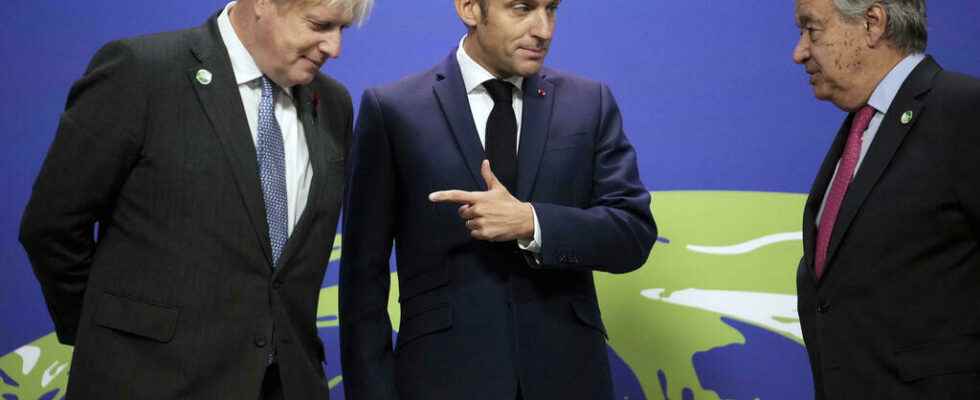After the dramatic sinking of a migrant boat which left 27 dead in the Channel on Wednesday, November 24, 2021, France invited next Sunday to Calais the European – and British – ministers concerned by the migration issue in the region. Mr. Macron wants to push his neighbors to solidarity. Mr Johnson wrote to him.
France announced this Thursday, November 25, the day after the worst human tragedy involving candidates for immigration to the United Kingdom in the Channel since 2018, the mobilization of reservists to try to prevent further tragic disappearances at sea. But it also called for enhanced cooperation with its neighbors, starting with Great Britain, without forgetting the Europeans.
Because Emmanuel Macron has learned the lesson of the “fish war”. France then found itself alone against the United Kingdom in the post-Brexit fisheries dossier. The head of state had even criticized his ministers for having presented it as a standoff between Paris and London, while all of Europe is concerned, explains Julien chavanne, from the political service of RFI.
In order not to make the same mistake, Paris therefore invites its Belgian, Dutch, British and German neighbors to Calais. Playing as a team is essential for Mr. Macron, who spoke during his visit to Croatia. ” France, in this case, is a transit country, he explained. We are fighting against these networks of smugglers, but for this we must improve European cooperation. We need stronger European cooperation in this area. “
► Also read: La Manche, a “new open-air marine cemetery” like the Mediterranean?
The timetable is favorable for Paris. On December 8, the European Commission will present its reform of the Schengen area, a dossier pushed by the Élysée, a few weeks before the French presidency of the Union. Emmanuel Macron wants more controls, even inside member countries. And that the file be sent directly to governments. To make Member States accountable and to force them to get involved in the management of migrants, in short.
France actually wants a more effective Schengen area against illegal migrants, sums up our correspondent in Brussels, Pierre Benazet. The request unofficially formulated by Paris is to be able to carry out border controls well beyond national borders, a little on the model of the floating customs. This will be one of the topics for discussion in Calais.
However, the question arises of the compatibility of this reintroduction of border controls with existing European law – when the proposal is in fact already under study. The European Commission will therefore make proposals to reform the Schengen border code itself. It will be between December 9 and 10, during the Council of European Ministers of Justice and the Interior.
► To reread: Shipwreck off Calais, a new stone in the Franco-British garden
France is, again, in the front row. With five other countries including Germany and Austria, it is one of those which have maintained since 2015 the controls – reintroduced on an exceptional basis – at the time of the migration crisis. These controls can only be reintroduced for six months, and their renewal must be justified each time.
The essential justification for countries in favor of the possibility of easily reintroducing border controls is to be able to guarantee the security of their territory, an argument which seems to have to be heard by the European Union. The functioning of Schengen is based on a high level of security in the EU, and there is, moreover, in the proposal expected from the Commission an important chapter on police cooperation.
There is also the legal point of view, that of the Advocate General of the Court of Justice of the Union, who considers that imposing a limitation on the duration of controls would be incompatible with the need to ensure the security. This proposal is still under construction, because since the Belarusian crisis, the instrumentalization of migrants is also part of the dossier.
Boris Johnson’s last dance steps
On Thursday, Boris Johnson said he had written to Emmanuel Macron to detail five measures that London and Paris could take together to avoid further tragedies in the Channel. Among these measures: the establishment of joint patrols intended to prevent migrant boats from leaving the French coasts, the use of detectors and radars, or the development of an agreement for the return of migrants with France and especially with the whole of the European Union.
The British Home Secretary, Priti Patel, says she has proposed to Paris to assign additional forces for joint patrols and promised to do ” absolutely everything that will be needed »To secure the Calais area. ” We have struggled to convince some of our partners, especially the French, to do things the way we feel is justified by the situation. “, Boris Johnson said Wednesday, while London is opposed to Paris also in the file of fishing.
One of the tenants’ proposals at 10 Downing Street, the last, could have this effect. Because Mr. Johnson, who finally published his letter on Twitter, asks the French president to take the migrants home, in essence. ” I propose that we put in place a bilateral readmission agreement to allow the return of all illegal migrants crossing the Channel », He wrote, recalling that« the EU has readmission agreements with countries like Belarus and the Russian Federation “.
Clever, but also provocative towards the Twenty-Seven, the British Prime Minister says ” hope that such an agreement can also be reached with the UK quickly “. ” This measure would have an immediate effect and would dramatically reduce – if not stop – crossings, saving lives by fundamentally breaking the business model of criminal gangs. », Writes Boris Johnson.
With agencies
